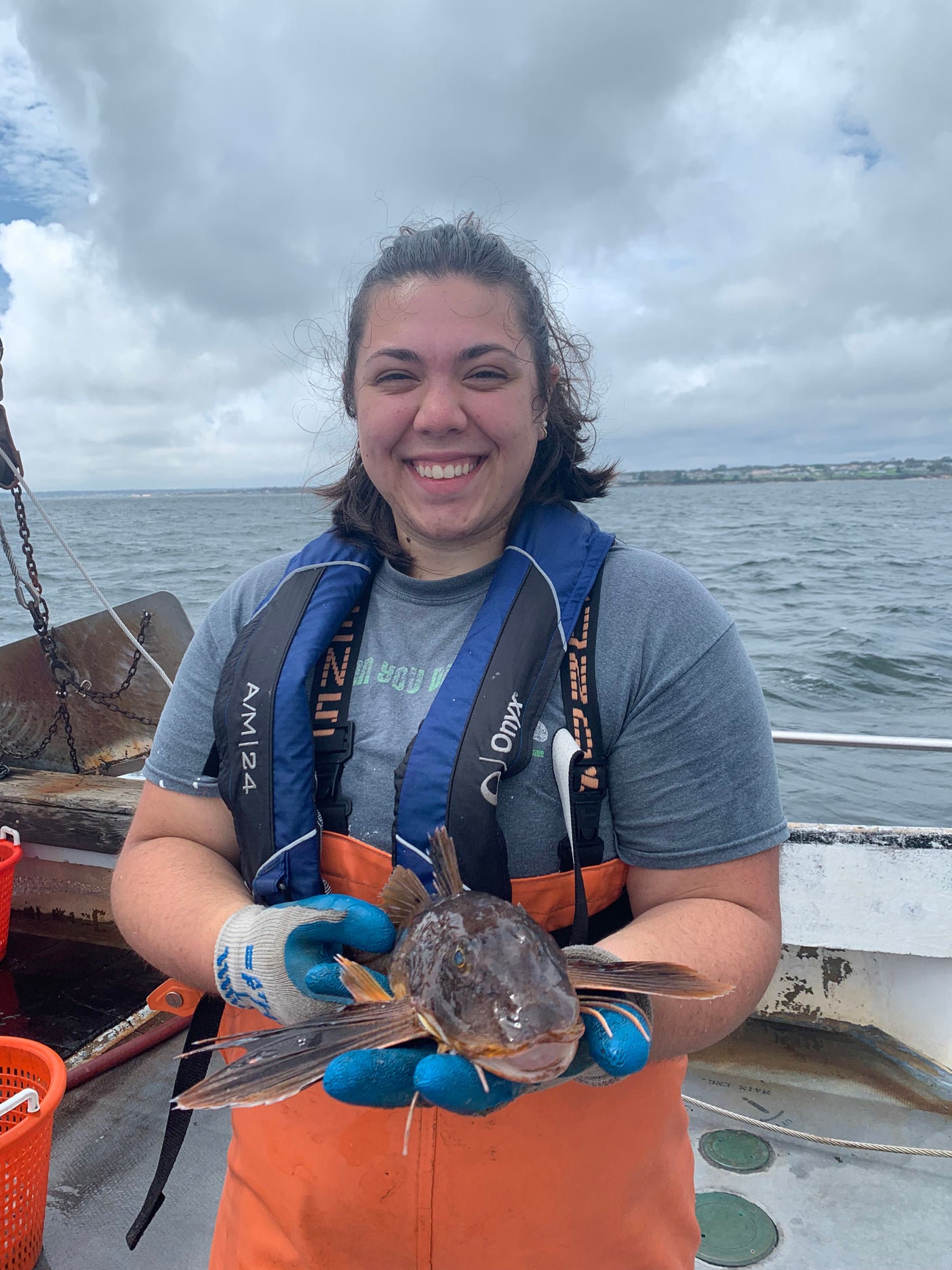Impact of changing climate, nutrients on seafloor creatures
University
of Rhode Island senior Gwen Riendeau was searching for her niche in the field
of marine biology, a narrow focus that few people may be studying so she has a
better chance of making an impact. 
URI senior Gwen Riendeau poses with a fish captured
during her research. (Photo courtesy of Gwen Riendeau)
That’s when she joined a URI research team
studying benthic ecology – the creatures living on or in the seafloor, like
worms, arthropods and mollusks – and how they are being affected by the
changing climate.
“It’s a broad and complicated project, but we’re using these benthic invertebrates as a model to look at the effects of global warming and eutrophication in Narragansett Bay from excessive nutrients being pumped into the water,” said Riendeau, a marine biology major from Brimfield, Massachusetts.
“I went on a boat for a couple days last summer to collect core samples from
three locations in the bay, and now we’re identifying the species we found.”
Working
in collaboration with URI Oceanography Professor Jeremy Collie and graduate
student Shaina Harkins, Riendeau is discovering that Narragansett Bay has
experienced an increase in biodiversity in recent years as the water has become
cleaner and warmer.
“There are more species that are able to come in and survive and thrive than in past years,” she said. “We found a huge diversity of worms, for example, more and a bigger variety of fish than in the last 20 or 30 years, and we even found a starfish that the team hadn’t seen in 10 years.”
Riendeau
said she is learning so much about human impacts on creatures that people
seldom think about.
“We
don’t think about the worms at the bottom of the bay that are dying because
they don’t have enough oxygen because of the things we’re doing, or about the
shellfish that can’t grow their shells because of ocean acidification from
climate change,” she said. “It’s really opened my eyes to what’s out there and
how we’re affecting things.”
She
was also surprised to learn how much she enjoyed working in a laboratory.
“That
was totally unexpected,” Riendeau said. “I used to volunteer at the Florida
Aquarium, and I was outside doing field work all the time. I thought lab work
was going to be boring, but I found that time goes by way faster than I thought
it would. It captures my attention from start to finish.”
Her
favorite part of the project, however, has been meeting and networking with the
professors and graduate students at the URI Graduate School of Oceanography.
“They
showed me that there are so many different avenues you can take in marine
biology, so many different projects to work on, very narrowly focused projects
rather than broad topics like I thought,” she said. “It’s more than I expected
to ever find.”
Riendeau’s
research was supported by the URI Coastal Fellows Program, a unique initiative
designed to involve undergraduate students in addressing current environmental
problems. Now in its 25th year, the program pairs students with a mentor and
research staff to help them gain skills relevant to their academic major and
future occupations.
As
the first woman in her family to go to college, Riendeau is looking forward to
graduation next May and entering graduate school. She is already preparing a
grant proposal to the National Science Foundation to fund her graduate
research, which she said will focus on benthic ecology in Alaska, though she is
also interested in studying fish communication and behavior. Eventually she
plans to continue her research while working in academia.
“I’m
open to whatever comes my way, but I really want to work at a university and
continue working in the lab and doing research,” she said. “Most of all, I want
to educate others who may not understand the human impacts on the environment.
Communicating science is a huge piece of the puzzle that seems to be missing.”